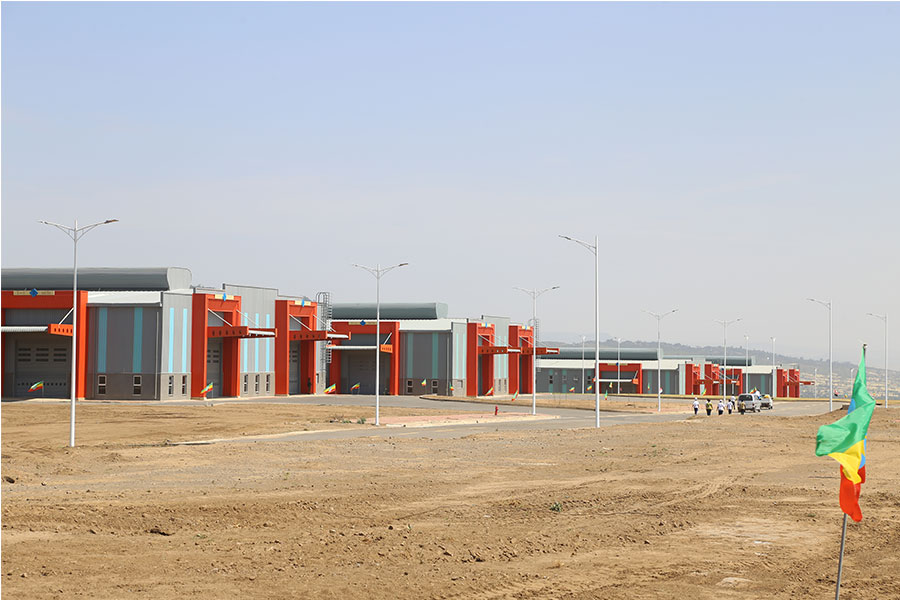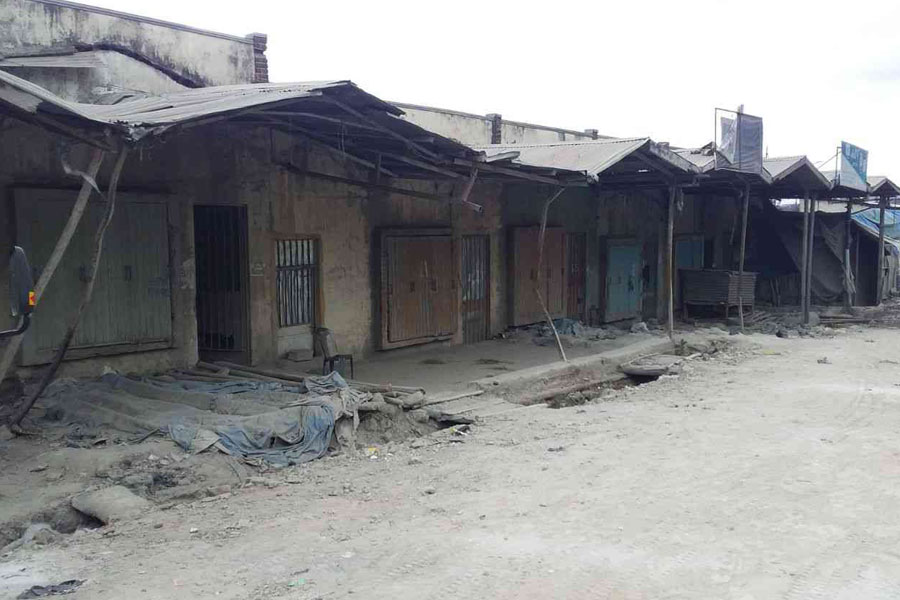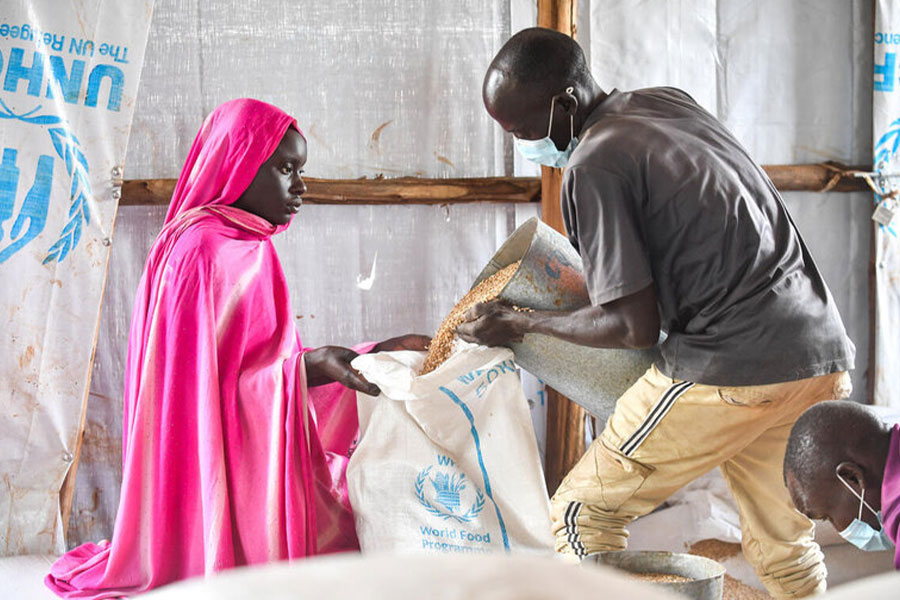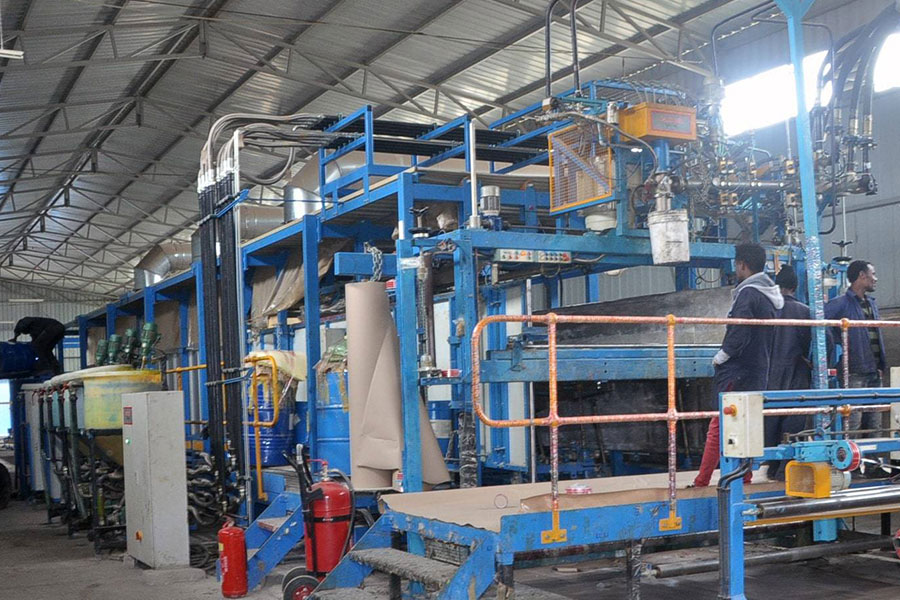
Fortune News | Jan 26,2019
On the afternoon of July 2, 2020, the shops and mini markets around Riche on Sierra Leone Street (Debre Zeit Road) had few customers since much of their shelves were empty. Milk and dairy products, bottled water and vegetable and fruit were all missing from their regular shelf locations.
Consumers of these products have been wandering all over the area searching for them in vain.
Aster Shatema, the mother of a five-year-old and a three-year-old, was looking for milk to buy for her children who consume a litre a day. Aster, who lives in Kirkos District, traveled to Piassa and Arat Kilo in search of milk. However, Aster’s search turned up empty.
“I couldn’t find even a single plastic canister to buy anywhere,” she told Fortune.
Milk retailers and shops in the capital are now empty of milk stocks due to the lockdown in the city after mass protests occurred in the city after Hachalu Hundessa, a famous singer, was killed. The protests, which started on Monday late at night and lasted through the week, have caused severe destruction and left millions worth of property damage to buildings and vehicles.
Dawit Ambaye, who owns a medium-size shop in Riche, used to sell about 30 half-litre containers of milk a day. He has been buying a single plastic container for 14 Br and selling them at 16 Br.
Dawit has encountered many customers in the past few days looking for milk, but he only has bad news to give them.
“Unusually, I'm now seeing many potential buyers who come from distant areas in search of milk,” said Dawit.
The road blockade and the unrest paused the supply of milk to the capital since most of the dairy farms are located on the outskirts of the capital in the Sebeta Agro-Industry Zone.
Family Milk Plc, which processes and packages its own brand of milk at Sebeta Agro-Industry Zone, has also ceased production and supply to the capital since early last week due to transportation closures starting last Tuesday.
“Transportation closures and now insecurities obliged us not to deliver our production to the market,” said Hailu Eshetu, CEO at the company.
Empty water jugs sit outside a shop in Riche.
The sharp supply shortages in the market are attributed to the temporary lockdown of the entrances to the capital, according to Eshete Asefa, state minister for Trade & Industry.
However, the four gates of the capital were opened for transportation as of July 3, according to Eshete.
“We're now working with the security apparatus to further secure the transportation of commodities to the capital,” he told Fortune.
The incident not only disrupted the milk supply but also the flow of other food products. The open vegetable market in Jan Meda, which recently moved from the popular Atikilt Tera due to COVID-19 precautions, now has few products. The prices of vegetables such as cabbage, onions, potatoes and tomatoes have also soared following the supply shortage.
Hamid Siraj, a vegetable retailer in the Jan Meda vegetable market, has noticed the recent price hike. On Monday, June 29, 2020, he was retailing a kilogram of tomatoes for 17 Br, but now he is selling them at 25 Br.
“Vegetable prices have sharply increased," he said. "I’m buying, for instance, a kilogram of tomatoes from wholesalers for 23 Br."
In the last fiscal year, the country produced 10.4 million, 4.6 million, 2.7 million, 2.6 million, and 235,838 quintals of potatoes, cabbage, khat, onions, and tomatoes, respectively.
Most vegetable prices have increased sharply. At the beginning of last week, Hamid was retailing a kilogram of red onions for 33 Br. However, on July 3, 2020, the price of Hamid’s onions increased by five Birr.
Additionally, the price of potatoes almost doubled from seven Birr a kilogram to 13 Br, while the price of cabbage doubled to eight Birr.
The supply of agricultural products that come from outside the capital has receded significantly. The supply of some products has dwindled entirely.
Khat is one of the commodities that has become almost non-existent in the market due to the transportation disruption. The price of what is left has skyrocketed.
Mujib Abdu, a Khat seller in Sidist Kilo, is also experiencing very little supply of the commodity. In front of his shop on July 3, around 15 consumers were lined up to claim the opportunity to scramble for the little amount of Khat that Mujib had in stock.
Mujib is now selling a handful of Khat for 350 Br that he used to sell for 80 Br.
Beyond the local consumption, the commodity is one of the commodities that bring a huge chunk of foreign currency from export. In the last fiscal year, Ethiopia generated 303.6 million dollars by exporting 53.6 million kilograms of Khat.
“Our suppliers from Hararghe, Wendo Genet and Jimma are not bringing the commodity because of the transport insecurity,” he said.
Most of the Khat shops near Agona and Riche in the capital have completely closed their doors.
Water bottlers are also struggling to stay operational and market their production at this moment. As a result, the capital is facing a water bottle shortage. The largest size of bottled water, the 20-litre jugs, are hard to find in the capital.
The medium-scale supermarket owned by Deme Ayana was empty of 20-litre jugs last week, but he had enough half-litre and litre bottles on hand. Many customers were asking Deme for jugs but he could not get them from the wholesalers.
“There is huge demand for the jugs,” he said.
This shortage is attributed to factories ceasing production amid transportation uncertainty.
Abbahawa Trading Plc, the bottler of One Water, temporarily stopped operations from Tuesday to Friday due to insecurity, according to Enyew Zeleke, general manager at the company. Located in Sebeta, Abbahawa has a production capacity of 60,000 bottles and 600 jugs of water an hour.
“We couldn’t operate and sell the products in storage,” Enyew said. "However, the problem goes beyond the current incident. The problem is related to inefficiencies in washing and packaging the jugs."
Unlike the smaller sized bottles, the jars can be reused. They will be collected through the retailers and delivered to the bottlers who will wash them and make them ready for bottling.
“We don’t produce new jugs because of the higher cost to manufacture them, which is about 180 Br,” Enyew told Fortune.
The washing process of the collected jugs usually takes at least three days. They soak the used jugs in chemicals for a day, and then they check samples before refilling them.
Currently, the management of the bottling company is planning to produce 20lt jugs for single packing and usage.
The capital also saw egg supply shortages due to the same transport disruption problem. Dagne Tegenu, an egg retailer in Sidist Kilo, only received a small supply of eggs last week compared to previous weeks. He encountered many customers who would buy eggs, but he had little in stock.
Dagne gets his eggs supplied from Bishoftu.
“They couldn’t supply me because of transportation insecurities,” said Dagne, who did not have eggs at his store until last Friday even after the roads to the city were opened.
The sharp supply shortage of such products is partly because these commodities are perishable, according to Honok Semaw, a lecturer of economics at Haramaya University.
The federal and regional governments should work hand in hand to preserve the supply chain, as it is highly sensitive and easily disrupted, according to Honok Semaw.
PUBLISHED ON
Jul 10,2020 [ VOL
21 , NO
1054]

Fortune News | Jan 26,2019

Agenda | Sep 14,2024

Fortune News | Nov 03,2024

Fortune News | Jan 01,2023

Radar | Aug 22,2020

Radar | Oct 12,2025

Fortune News | Mar 14,2020

Exclusive Interviews | Apr 19,2025

Commentaries | May 16,2020

Fortune News | Mar 27,2021

Dec 22 , 2024 . By TIZITA SHEWAFERAW
Charged with transforming colossal state-owned enterprises into modern and competitiv...

Aug 18 , 2024 . By AKSAH ITALO
Although predictable Yonas Zerihun's job in the ride-hailing service is not immune to...

Jul 28 , 2024 . By TIZITA SHEWAFERAW
Unhabitual, perhaps too many, Samuel Gebreyohannes, 38, used to occasionally enjoy a couple of beers at breakfast. However, he recently swit...

Jul 13 , 2024 . By AKSAH ITALO
Investors who rely on tractors, trucks, and field vehicles for commuting, transporting commodities, and f...

Oct 11 , 2025
Ladislas Farago, a roving Associated Press (AP) correspondent, arrived in Ethiopia in...

Oct 4 , 2025
Eyob Tekalegn (PhD) had been in the Governor's chair for only weeks when, on Septembe...

Sep 27 , 2025
Four years into an experiment with “shock therapy” in education, the national moo...

Sep 20 , 2025
Getachew Reda's return to the national stage was always going to stir attention. Once...